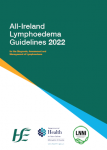The 2022 All-Ireland Guidelines for the diagnosis, assessment and management of lymphoedema

Lymphoedema is a progressive, chronic condition, which has major personal, social and economic impact, and effects an estimated 45,000 people in Ireland and Northern Ireland combined. Healthcare is an ever-changing science where advances and new developments in lymphoedema continue to take place. Evidence-based knowledge and skills related to advancing lymphoedema management are of crucial importance in delivering care safely, effectively and efficiently, and the last decade has produced a plethora of lymphoedema-based research. As such, a new All-Ireland Guideline for lymphoedema diagnosis, assessment and management was required to replace the 2008 CREST Guideline.
A research team was commissioned to work with healthcare staff and service users following international research standards practice. A Guideline Development Group and Work Stream Groups were formed with service users and members from varied, relevant professional backgrounds, and a systematic review of published guidelines and studies undertaken using PubMed, Embase and CINAHL. Recommendations were formulated based on the evidence available to answer each clinical question, and were assigned a grade based on the strength of the evidence. In the absence of sufficient evidence and in an effort to maximise clinical applicability, recommendations were also based on expert opinion, which was gathered via guideline member consensus. Two rounds of both internal and external (UK and Ireland wide) consultations were completed prior to publication. (Rankin et al, 2022)
The partnership approach by the Health Service Executive (HSE), Republic of Ireland, and Health and Social Care (HSC) Northern Ireland, facilitated a cross-border initiative to address this resource gap via an integrated work programme, which exemplifies strategic cross border working and provides an evidence base and recommendations for practice across Ireland. The objective is to ensure that all citizens have access to local, evidence based lymphoedema resources, and aims to ensure that all involved in health delivery recognise the extending role of lymphoedema management, and to act as a guide for managers and commissioners to support development and modernisation of pathways of lymphoedema care, education and research.
The review challenges current pathways, healthcare practices and technology. In particular, it supports the move to shared care, with its increased recognition of the chronic conditions model, and the need to improve service user empowerment to enable supported lifelong self-management, and both physical and psychological coping skills. Similarly, the lymphoedema screening and surveillance model as part of cancer rehabilitation, will help with early identification of sub-clinical lymphoedema for known at-risk cancer-related sub groups, thereby reducing the risk of developing this long-term condition and providing early treatment to minimise progression. It has highlighted health complexity changes including the increasing numbers of frail elderly citizens, those living with multi-morbidities and the substantial increase in those living with obesity. New service challenges, such as, the increasing number of children with lymphoedema, those living with palliative lymphoedema needs, and the impact of global bariatric issues have been addressed in independent sections within the guideline. This document provides the evidence, recommendations and pathways to support a more effective and prudent use of resources as part of wider multi-professional teams.
References:
- Clinical Resource Efficiency Support Team (CREST). Guidelines for the diagnosis, assessment and management of lymphoedema. Department of Health, Social Services and Public Safety Northern Ireland (DHSSPSNI), Belfast. 2008. https://www.lymphoedemasupportni.org/sites/default/files/crest_guidelines_on_the_diagnosis__assessment_and_management_of_lymphoedema.pdf (accessed 30 August 2022)
- Health Services Executive (RoI) and Health and Social Care (NI), 2022. All Ireland Guidelines for diagnosis, assessment and management of lymphoedema 978-1-78602-215-8 www.lnni.org and www.hse.ie/lymphoedema
- Rankin, J., Morris, K. and Reilly, A. 2022 The All Ireland Guidelines for the diagnosis, assessment and management of lymphoedema. British Journal of Community Nursing Chronic Oedema Supplement October 2022
Jane Rankin, Clinical Lead, Lymphoedema Network Northern Ireland, HSC, and Kay Morris, Project Lead Lymphoedema Services, HSE




